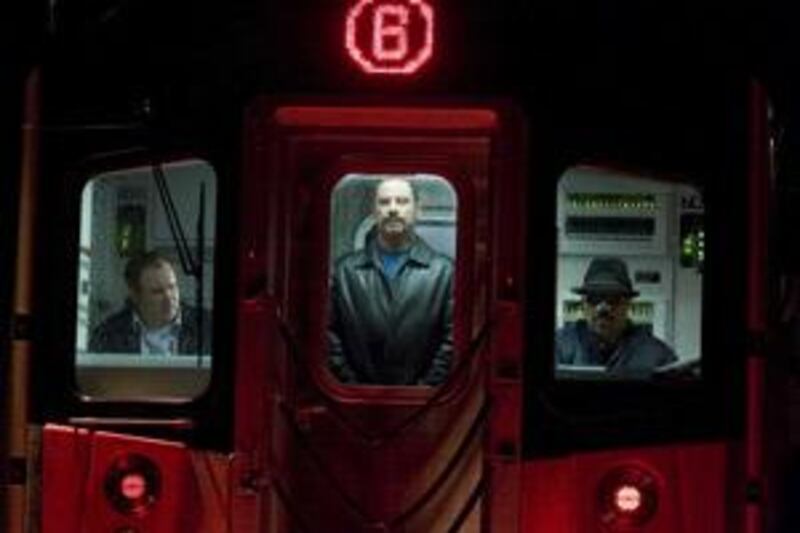Formerly known as one of the many inspirations for Quentin Tarantino's Reservoir Dogs, the 1974 robbery movie The Taking of Pelham 123 is transformed by the slam-bam auteur Tony Scott into a thing of brute efficiency. The plot, retrieved from John Godey's source novel, is still fundamentally untouched - a New York subway train is hijacked by a devious criminal who will return his newly acquired hostages for a king's ransom, but in the process might be thwarted by a master antagonist called Garber. In this case, the criminal has evolved from Robert Shaw playing a British mercenary to John Travolta playing an American nihilist, while the antagonist, once a cop portrayed by Walter Matthau, is now an instinctively gifted train dispatcher in the guise of Denzel Washington.
We know that Garber is instinctively gifted because, almost from the first frame, co-workers in the midtown control room from which he conducts the daily traffic through the New York subway system, marvel at him with awe as he effortlessly switches trains and lines from Uptown to Downtown and back again. "You're the maestro!" says one particularly fawning colleague, just to remind us that Garber's job may lack glamour but, as played by Washington, it's a thing of near numinous beauty (What is it with movie stars? Why can't they just do normal jobs, normally?). We later discover that, due to an impending internal investigation, Garber has been "demoted" to the position of dispatcher from the more prestigious title of "train buyer" - how brilliant he was at that particular post we can but guess.
Garber's day, nonetheless, is duly ruined at 2pm by Travolta's hijacker, known only as Ryder (he was Mr Blue in the original film, but then Tarantino stole that). The timings are apparently important here, especially when Ryder gives Garber and, effectively, the city of New York, 60 minutes to produce his $10 million ransom (Dh3.67m). Thus, Ryder spends much of the second act roaring down the line to Garber like an angry expletive-spewing version of the talking clock, reminding him of the time. Supporting characters, including James Gandolfini's New York mayor, tend to do the same. Even the screen is forever blinging to life with the director Tony Scott's digital timecode, which announces ominous warnings such as "48 minutes to deadline". In other words, screams the movie, this is very exciting! They're up against it; it's all a big, thrilling, rush!
And just in case we didn't get the adrenalised message, Scott does what Scott does best and delivers the stylistic equivalent of a cartoon frying pan to the head - whip pans, smudge motion, crash zooms, shaky-cam, and a myriad of nanosecond cuts. This truly is a director who never met a scene he couldn't shoot with 90 different cameras at the same time. And yet there is fun to be had in the midst of all these macho pyrotechnics. Washington, in his fourth collaboration with Scott, provides the latter with a still dramatic core around which the director can spin his giddy distractions. He remains an actor of breathtaking ease and someone who can suddenly muster a world of feeling, almost casually, in the smallest throwaway scenes (Garber's eyes momentarily fill with tears when he recalls taking a bribe). Travolta, on the other hand, is an insufferable ham but no less entertaining for it. His Ryder is a screen-chewing crackpot, straight out of the Dennis Hopper school of movie villains. The performance is built entirely upon an Iron Cross earring, a hefty handlebar moustache and a not particularly impressive ability to alternate between normal speaking voice and shouting - just to let you see that he's completely crazy.
Typically, as is de rigueur in action movies now, the two men vaguely bond during high-tension exchanges over the radio link, with one clearly representing the metaphorical flip side of the other - Ryder is where crime could take Garber, while Garber fundamentally is where Ryder should be. But in the end, as the genre demands, they must duke it out, mano-a-mano, until only the righteous survives. It is, ultimately, featherweight stuff, and in its own way quite an achievement to make a contemporary crime movie set in present day New York, that nonetheless has nothing to say on the subject of modern life other than "Honesty is the best policy". The Taking of Pelham 123 is silly, cosy and occasionally exciting. But if there is more to this film than two actors, a director and a train set, it is hiding very well indeed.





